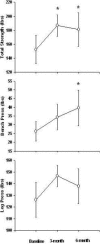Resistance training improves sleep quality in older adults a pilot study
- PMID: 24453540
- PMCID: PMC3887339
Resistance training improves sleep quality in older adults a pilot study
Abstract
Older individuals, as a group, tend to experience difficulty sleeping compared to younger adults. Improving sleep in the elderly would have beneficial public health consequences. This study utilized 8 sedentary, older adults, 78.1 ± 3.1 years of age, who participated in a six-month long resistance training (RT) program. The Pittsburgh Sleep Quality Index (PSQI) was used to examine sleep quality, and a 1 repetition max test (1-RM) was used to determine upper (bench press) and lower (leg press) body strength. Total strength, defined as the sum of the bench press and leg press 1-RM results, was also reported. The training resulted in significant improvements (p < 0.05) in total (19%) and upper body (52%) strength and in sleep quality (38%). Future studies should examine the effects of strength gain/loss and time-of-day training on sleep quality. Key PointsCompromised sleep and deterioration of skeletal muscle mass and function are commonly found among the aged.Results show that RT led to improvements in upper and total body strength in older participants who trained three times per week in the morning.The resistance training led to improvements in sleep as measured by a self-report sleep questionnaire, the Pittsburgh Sleep Quality Index.The small sample size used, lack of control group, and the fact that the participants on average were characterized as "good "sleepers at the study onset, necessitates that further investigation occur.We suggest that further research is required to explore the effects of RT performed at different times of the day as well as to determine the relationship between sleep gains or losses upon changes in sleep quality.
Keywords: Chronic disease; older participants; resistance training; sleep; strength.
Figures


References
-
- Booth F.W., Chakravarthy M.V., Gordon S.E., Spangenburg E.E. (2002) Waging war on physical inactivity: using modern molecular ammunition against an ancient enemy. Journal of Applied Physiology 93, 3-30 - PubMed
-
- Buysse D.J., Reynolds C.F. 3rd, Monk T.H., Berman S.R., Kupfer D.J. (1989) The Pittsburgh Sleep Quality Index: a new instrument for psychiatric practice and research. Psychiatry Research 28, 193-213 - PubMed
-
- Buysse D.J., Reynolds C.F. 3rd, Monk T.H., Hoch C.C., Yeager A.L., Kupfer D.J. (1991) Quantification of subjective sleep quality in healthy elderly men and women using the Pittsburgh Sleep Quality Index (PSQI). Sleep 15, 83 - PubMed
-
- Crystal S., Johnson R.W., Harman J., Sambamoorthi U., Kumar R. (2000) Out-of-pocket health care costs among older Americans. Journals of Gerontology Series B: Psychological Sciences and Social Sciences 55, S51-62 - PubMed
-
- Driver H.S., Taylor S.R. (2000) Exercise and sleep. Sleep Medicine Reviews 4, 387-402 - PubMed
LinkOut - more resources
Full Text Sources
Medical
